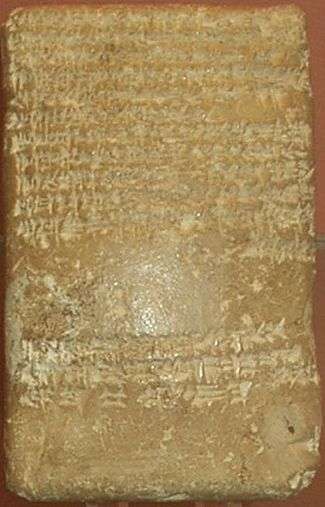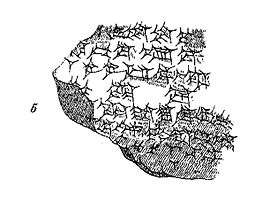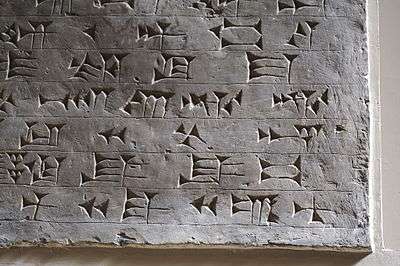Bi (cuneiform)
The cuneiform bi sign, also pí, and used for other syllabic forms, as well as a sumerogram, is a common use syllabic and alphabetic cuneiform sign used in both the mid-14th century BC Amarna letters and the Epic of Gilgamesh. In the Amarna letters, it is sometimes used for the spelling of the archers (Egyptian pitati), 'pí-t(x)-t(x)', an often requested need from the Pharaoh in the vassal state sub-corpus of the letters.


Last line: 'a series of gifts' "...I send (to) you." ("...ul-te-bi-la..x-x.") (Akkadian language, "abālu", to bring, carry)[2]
(photo, out-of-focus)
| Wikimedia Commons has media related to Bi (cuneiform). |
As a sumerogram, (capital letter (majuscule)), sign bi is used for KAŠ, Akkadian language for "šikāru",[3] beer.
The following linguistic elements for bi are used in the Epic:[4]
- bé
- bi
- gaš
- kaš
- pí
- KAŠ, sumerogram: "beer"
The bi sign's usage numbers in the Epic of Gilgamesh are as follows: bé-(25 times), bi-(190), gaš-(1), kaš-(12), pí-(2), KAŠ-(1).[5]
Amarna letters usage
Use of pí, Egyptian archers
The archers were part of the Egyptian army, and often requested by the Canaanite vassal city-states, when writing to the Pharaoh in the Amarna letters. They were named the pitati, Akkadian language "piṭātu",[6] "troops of soldiers", and spelled in a variety of ways, often starting with the bi sign as pí.
A partial listing of spellings of "ERIM.MEŠ-pitati", by Amarna letter:
References
- Moran, William L. 1987, 1992. The Amarna Letters. EA 9, Ancient Loyalties, New Requests, pp. 18-19.
- Parpola, 197l. The Standard Babylonian Epic of Gilgamesh, Glossary, pp. 119-145, abālu, p. 119.
- Parpola, 197l. The Standard Babylonian Epic of Gilgamesh, Glossary, pp. 119-145, šikāru, p. 142.
- Parpola, 197l. The Standard Babylonian Epic of Gilgamesh, Sign List, pp. 155-165, Sign no. 214, p. 159.
- Parpola, 197l. The Standard Babylonian Epic of Gilgamesh, Sign List, pp. 155-165, Sign no. 214, p. 159.
- Rainey, 1970. El Amarna Tablets, 359-379, Glossary:Vocabulary, piṭātu, pp. 55-87, p. 75.
- Moran, William L. 1987, 1992. The Amarna Letters. Johns Hopkins University Press, 1987, 1992. 393 pages.(softcover, ISBN 0-8018-6715-0)
- Parpola, 197l. The Standard Babylonian Epic of Gilgamesh, Parpola, Simo, Neo-Assyrian Text Corpus Project, c 1997, Tablet I thru Tablet XII, Index of Names, Sign List, and Glossary-(pp. 119–145), 165 pages.
- Rainey, 1970. El Amarna Tablets, 359-379, Anson F. Rainey, (AOAT 8, Alter Orient Altes Testament 8, Kevelaer and Neukirchen -Vluyen), 1970, 107 pages.
|
|

